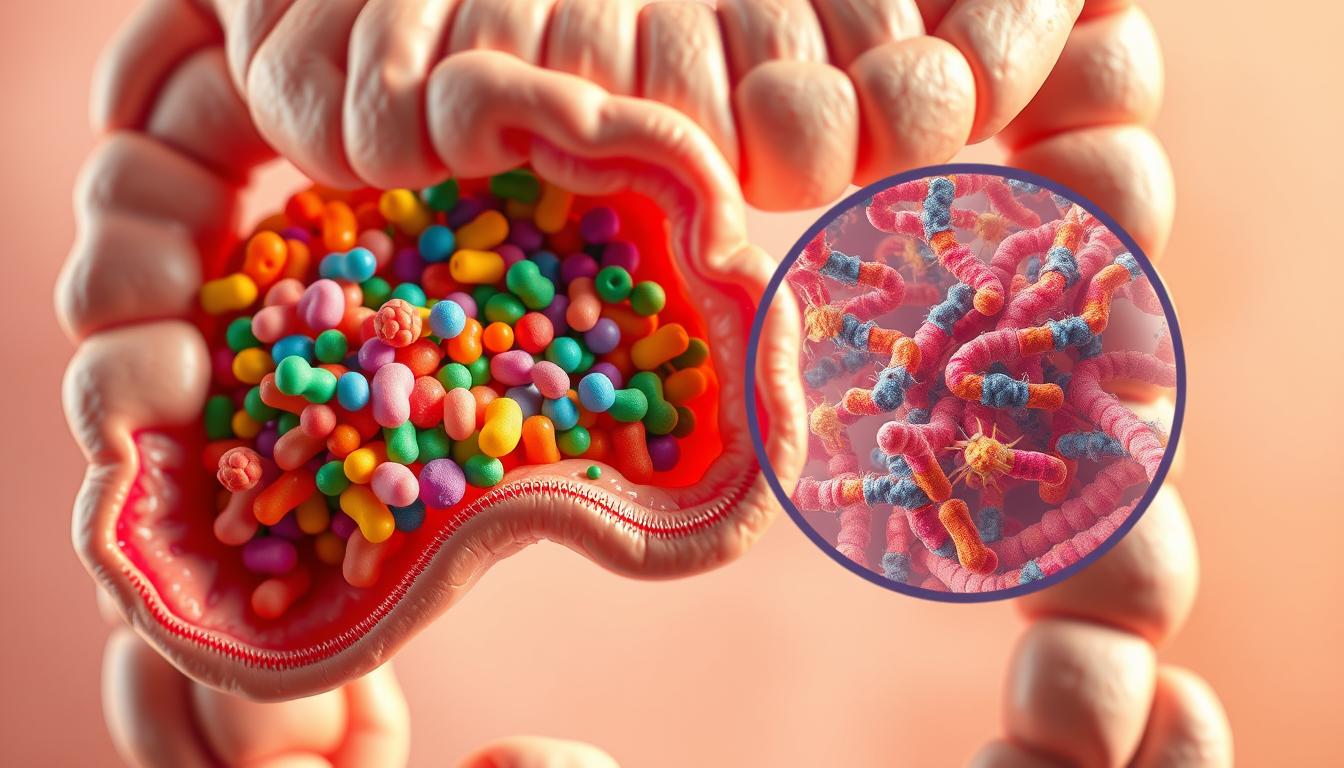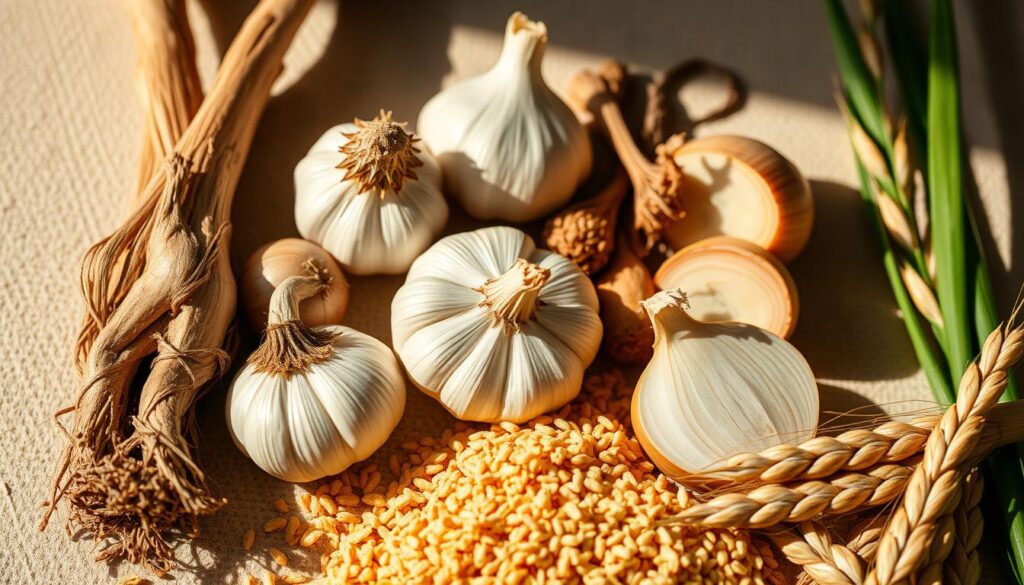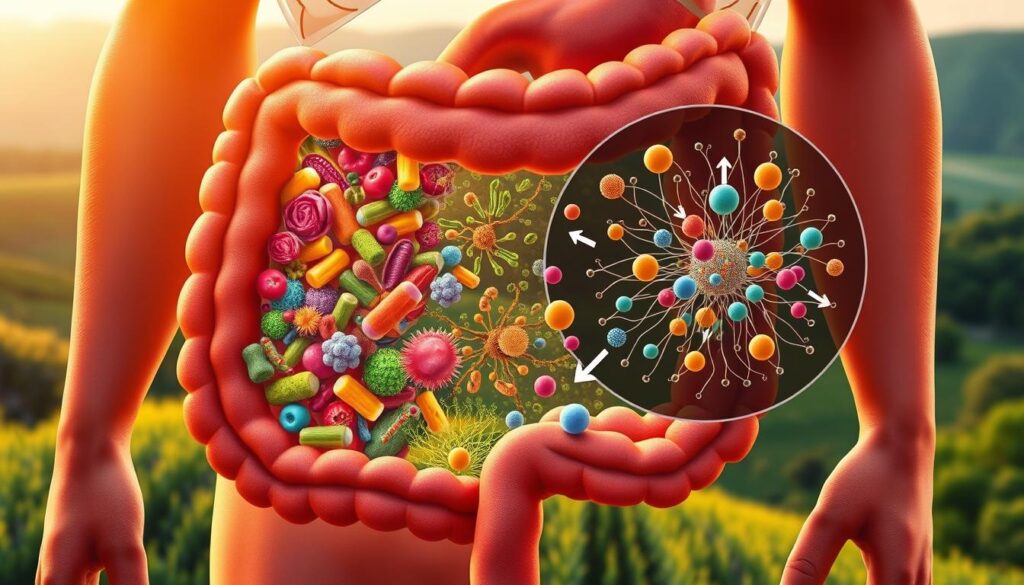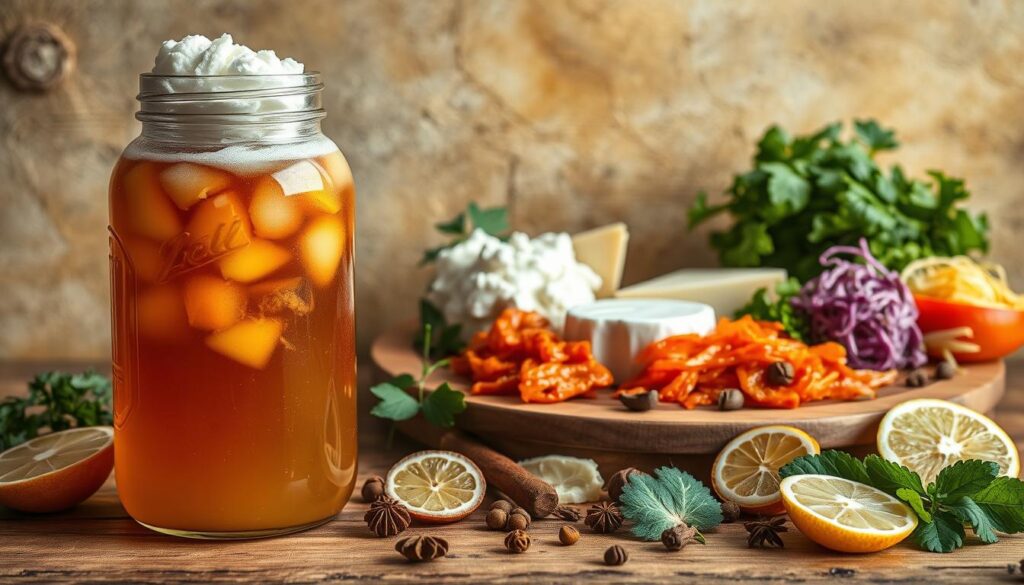Probiotics and Prebiotics: Boost Your Gut Health
You’ve probably heard about the importance of a healthy gut. But do you know how to…

You’ve probably heard about the importance of a healthy gut. But do you know how to get it? Probiotics and prebiotics are key to a good digestive system.
These two work together to help digest food and ease illness symptoms. Adding probiotics-rich foods or supplements can greatly improve your health.
Learning about prebiotics and probiotics helps you make better choices for your gut. They support your digestive system, boosting your health.
Key Takeaways
- Probiotics and prebiotics support gut health.
- A healthy gut contributes to overall well-being.
- Incorporating probiotics-rich foods can alleviate symptoms.
- Prebiotics help the body digest food.
- Maintaining gut health is key for overall health.
Understanding Probiotics: The Good Bacteria
Your gut is full of bacteria. Probiotics help keep it balanced. They are the good bacteria in your gut.
What Are Probiotics?
Probiotics are live good bacteria. They help your gut stay healthy. They keep bad bacteria away.
How Do Probiotics Work?
Probiotics add good bacteria to your gut. This helps with digestion and boosts your immune system. They even make vitamins.
Common Types of Probiotics
There are many types of probiotics. Lactobacillus and Bifidobacterium are common. They are in yogurt and kefir.
Other types like Streptococcus and Bacillus are also used. Each type has its own benefits. Choose the right one for you.
Knowing about probiotics helps you support your gut. They can improve digestion and boost your immune system. Probiotics are great for your gut health.
The Role of Prebiotics in Digestion
To keep your gut healthy, it’s key to understand prebiotics. Prebiotics are parts of food that help good bacteria grow in your intestines. They make digestion better and lower the chance of metabolic problems.

Defining Prebiotics
Prebiotics are a kind of dietary fiber that feed the good bacteria in your gut. Foods like asparagus, bananas, and onions are full of them. They have fructooligosaccharides, a carb that’s fermented by gut bacteria.
Eating foods rich in prebiotics helps good bacteria grow. This makes your gut health better.
Importance of Fiber for Gut Health
Dietary fiber is vital for a healthy gut. It acts as a prebiotic and helps with bowel movements. A diet high in fiber leads to a healthier gut microbiota.
- Increased satiety and weight management
- Improved blood sugar control
- Enhanced immune function
Eating more prebiotic-rich foods helps your gut health. It also improves your overall well-being.
The Benefits of Taking Probiotics
Probiotics help your gut and boost your immune system. They make you feel better overall. Adding probiotics to your day can really improve your health.
Improved Digestive Health
Probiotics keep your gut healthy. This is key for digesting food and getting nutrients. Research has shown they help with IBS, IBD, and other gut problems.
“Probiotics can lessen bloating, gas, and stomach pain in IBS,” a study found.
“Probiotics are a promising treatment for gut issues.”

Strengthened Immune System
Your gut is a big part of your immune system. Probiotics keep your gut healthy, making your immune system stronger. They help keep bad stuff out of your blood, lowering infection risk.
A strong immune system fights off sickness. Probiotics boost it by making more antibodies and activating immune cells.
Potential Mental Health Benefits
The gut and brain talk to each other through the gut-brain axis. Probiotics can affect this, possibly improving your mood. They might help with anxiety and depression.
Dr. Jane Smith, a top microbiology expert, says, “The gut-brain link is clear, and probiotics lead this research.” Early signs are good, showing probiotics could help your mental health.
How Prebiotics Support Gut Flora
Prebiotics feed the good bacteria in your gut. This helps keep your digestive system balanced. They make a home where these good microbes can grow well.
Feeding the Good Bacteria
Prebiotics give food to the good bacteria in your gut. They are special fibers that help these microbes grow and work better. This makes your gut healthier.
Eating foods with prebiotics can make your gut microbiome stronger and more diverse. Foods like asparagus, bananas, and onions are great for this. You can add them to your meals every day.

Enhancing Nutrient Absorption
Prebiotics help the good bacteria grow and also help your body absorb nutrients better. They make the gut environment better. This means your body can use more nutrients.
This better nutrient absorption can make you feel more energetic and have a stronger immune system. Adding prebiotics to your diet helps keep your gut healthy. It’s good for your overall health too.
Food Sources of Probiotics
Probiotics are found in many foods and supplements. This makes it easy to keep your gut healthy. Adding these to your daily routine helps balance your gut microbiome.
Fermented Foods to Try
Fermented foods are full of probiotics. Here are some tasty options:
- Yogurt: Choose yogurt with “live and active cultures” for probiotics.
- Sauerkraut: This fermented cabbage is packed with probiotics and vitamins.
- Kefir: A fermented milk drink with many probiotic bacteria.
- Kimchi: A spicy Korean dish that’s good for your gut.
- Miso: A fermented soybean paste for soups and sauces.

Popular Probiotic Supplements
Supplements are great if you can’t get enough probiotics from food. When picking a probiotic supplement, think about:
- Strain Variety: Choose supplements with many probiotic strains.
- CFU Count: Make sure the CFU count is high for effectiveness.
- Brand Reputation: Pick a trusted brand that follows good practices.
Choosing the right probiotic supplement supports your gut health, even without fermented foods.
Food Sources of Prebiotics
Prebiotics are in many foods we eat every day. This makes it easy to help our gut health. Start by eating more high-fiber foods, which are full of prebiotics.
Everyday Foods Rich in Prebiotics
Bananas, onions, garlic, and asparagus are great sources of prebiotics. They are also full of fiber and can be used in many ways. For instance, adding garlic to your meals can give you a prebiotic boost.
Whole wheat bread, oats, and barley are also prebiotic-rich. Adding them to your breakfast or as sides is a good start. You can also check out other prebiotic foods to mix up your diet.
How to Incorporate Prebiotics into Your Diet
Start your day with a prebiotic-rich breakfast. Try oatmeal with bananas and a bit of garlic powder. It’s tasty and good for you.
For lunch and dinner, add more fiber-rich veggies like asparagus and onions. Roast them or add them to your favorite dishes.
“A healthy gut is the foundation of overall well-being, and prebiotics play a key role in keeping it healthy.”
Here are some easy ways to get more prebiotics:
- Eat a variety of fruits and veggies every day.
- Use whole grains in your meals.
- Try new recipes with prebiotic-rich foods.
By making these small changes, you can greatly improve your gut health and overall well-being.
Probiotics vs. Prebiotics: Key Differences
Probiotics and prebiotics are different but work together for a healthy gut. Probiotics add good bacteria to your gut. This boosts your digestion and immune system. Prebiotics feed these good bacteria, helping them grow and multiply.
Their Unique Functions
Probiotics add live, good bacteria to your gut. This can make digestion better, lessen IBS symptoms, and boost your immune system. Probiotics are found in foods like yogurt, kefir, and sauerkraut, or in supplements.
Prebiotics are fibers that feed the good bacteria in your gut. They help these bacteria grow, making your gut healthier. Foods like asparagus, bananas, and onions are good sources of prebiotics.
- Probiotics introduce beneficial bacteria.
- Prebiotics nourish the existing beneficial bacteria.
- Together, they create a synergistic effect that enhances gut health.
Why They Work Best Together
Probiotics and prebiotics are better together. This mix is called synbiotics. Synbiotics introduces good bacteria and feeds them, improving gut health.
- Enhanced survival of beneficial bacteria.
- Improved gut health through a balanced microbiome.
- Better nutrient absorption and utilization.
Knowing how probiotics and prebiotics work together helps you improve your gut health. Adding both to your daily routine, through food or supplements, can greatly benefit your health.
Choosing the Right Probiotic for You
There are many probiotic products out there. It can be hard to pick the right one. Knowing what to look for is key to finding the best probiotic for you.
Factors to Consider
When picking a probiotic, think about a few things. Strain specificity is important because different strains help in different ways. For example, Lactobacillus and Bifidobacterium help with digestion.
The CFU (Colony-Forming Units) count is also key. It shows how many live bacteria are in the product.
- CFU count: Look for products with a good CFU count for best results.
- Strain specificity: Pick a product with strains that match your health needs.
- Expiration date: Make sure the product is fresh to keep it effective.
Reading Labels: What to Look For
Reading the label is a big part of choosing a probiotic. Here’s what to look for:
- Probiotic strains: Find out which strains are in the product.
- CFU count: Check how many CFUs are in each serving.
- Expiration date or shelf life: Make sure it’s good until you use it.
- Additional ingredients: Know what else is in the product.
For more help in picking a probiotic, check out Cleveland Clinic’s guide on choosing probiotics.
By thinking about these points and knowing how to read labels, you can pick a probiotic that’s good for you.
Combining Probiotics and Prebiotics
Probiotics and prebiotics together are called synbiotics. They help your gut health a lot. “Synbiotics represent a holistic approach to gut health, where the whole is greater than the sum of its parts,” experts say.
Benefits of Synbiotics
Synbiotics add good bacteria (probiotics) to your gut and feed them (prebiotics). This helps with improved digestion, a stronger immune system, and even mental health benefits. The good things about synbiotics are:
- Enhanced gut flora balance
- Better nutrient absorption
- Boosted immune function
Dr. some expert’s name said, “The right mix of probiotics and prebiotics can change your gut health.” This mix helps good bacteria grow. Your digestive system gets stronger and more resilient.
Simple Recipes to Get Started
Adding synbiotics to your diet is easy and tasty. Here are some recipes to start with:
- Synbiotic Smoothie: Blend probiotic yogurt, bananas, and spinach for a healthy smoothie.
- Fermented Vegetable Dish: Mix fermented veggies like sauerkraut or kimchi with garlic and onions for a tasty side dish.
Adding synbiotics to your daily life helps keep your gut healthy. Try different recipes and find what works best for you.
“The future of gut health lies in understanding the complex interactions between our microbiome and the foods we eat.” –
Potential Risks and Side Effects
It’s important to know the risks and side effects of probiotics. They are usually safe for most people. But, they can cause problems for some.
Who Should Be Cautious?
People with weak immune systems need to be careful. This includes those with HIV/AIDS, on chemotherapy, or taking drugs that weaken the immune system. Always talk to a doctor before starting probiotics, if you have a serious health issue.
Other groups should also be careful:
- Those with allergies or sensitivities
- People who are very sick or have a weak immune system
- Pregnant or breastfeeding women, because we don’t know how probiotics affect babies
Common Reactions to Probiotics
Some people might feel side effects from probiotics. These can include:
- Feeling bloated, gassy, or having stomach pain
- Mild allergic reactions like rashes or itching
These side effects are usually mild and go away on their own. But, if they don’t or get worse, you should see a doctor.
To avoid side effects, start with a small dose. Then, slowly increase it if needed. Always pick a probiotic that has scientific backing and is made by a trusted company.
Tips for Maintaining a Healthy Gut
Keeping your gut healthy is more than just eating probiotics and prebiotics. It’s about making lifestyle changes and drinking enough water. A few simple steps can really help your gut health.
Simple Lifestyle Adjustments
Changing your lifestyle can greatly improve your gut health. Exercise, managing stress, and sleeping well are key. Exercise boosts digestion, stress management lowers inflammation, and sleep is vital for your gut.
Staying Hydrated for Gut Health
Drinking water is very important for a healthy gut. It helps your body use nutrients and fiber better. It also keeps your bowel movements regular. Drink lots of water every day to help your gut.
By following these tips, you can keep your gut healthy and feel better overall.
FAQ
What are probiotics and how do they support gut health?
Probiotics are live, good bacteria that help your gut stay healthy. They support digestion and boost your immune system. They keep your gut flora balanced, helping with digestion and overall health.
What are prebiotics, and how do they differ from probiotics?
Prebiotics are special fibers that feed the good bacteria in your gut. They help these bacteria grow and work better. Unlike probiotics, prebiotics feed the bacteria you already have, improving nutrient absorption and gut health.
Can I get enough probiotics and prebiotics from food alone?
Yes, you can get them from foods like yogurt and fruits. But supplements can help if you miss out. Eating foods rich in probiotics and prebiotics supports your gut health.
What are the benefits of taking probiotic supplements?
Supplements can improve digestion and boost your immune system. They might even help your mental health. Choose a supplement with many strains and a high CFU count for best results.
How do I choose the right probiotic supplement for my needs?
Look at the strains, CFU count, and expiration date on the label. Research the maker to make a smart choice.
Are there any potentially harmful effects of probiotics?
Probiotics are usually safe but might cause bloating or gas in some. People with weak immune systems should be careful. Talk to a doctor if you’re worried.
Can I combine probiotics and prebiotics for enhanced benefits?
Yes, mixing them can help your gut health even more. Try recipes that mix probiotic and prebiotic foods for a boost.
How can I maintain a healthy gut through lifestyle adjustments?
Drink plenty of water, manage stress, and eat a balanced diet. Exercise and sleep well too. These habits help keep your gut healthy.
